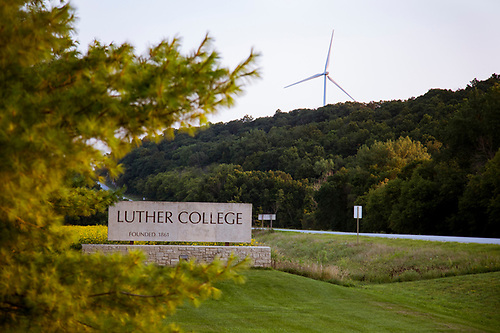On March 4, 2025, a vote will take place that affects both Decorah residents and Luther students.
Currently, both Luther College and the city of Decorah’s power are provided by an Investor-owned utility (IOU) called Alliant Energy. However, some citizens along with the Decorah City Council are unsatisfied with some of the aspects of Alliant Energy and are holding a vote in order to explore other options. These groups are interested in a different service provider called a municipal electric utility (MEU), which, according to the Voter Education Information provided by the city of Decorah, is “owned and operated by the local government.”
Voting takes place from 7 a.m. to 8 p.m. on Tuesday, March 4, at Good Shepherd Lutheran Church in Decorah. Early voting will take place from now until the morning of voting day. The Luther College Center for Sustainable Communities (CSC) will be hosting a shuttle service to transport students to the church from 8 a.m. to 2 p.m., departing from the Dahl Centennial Union. Hometown Taxi will also be providing free rides to the Church for voters as well. All students are eligible to vote as long as they are registered to vote in Decorah. To register, students need to bring a form of identification (school identification, driver’s license, passport, etc.) and proof of residency provided by Luther College Residence Life. If students still have their proof of residency email from the presidential election in November, it will work for this vote as well.
What YOUR Vote Means
The 2025 referendum does not immediately establish a MEU in Decorah. Instead, it determines whether the city gains the option to form an MEU on paper. Despite misconceptions that this vote means immediate municipalization, a ‘yes’ or ‘no’ vote will not alter Alliant Energy’s current role as Decorah’s sole electric provider. This referendum has been called because Alliant Energy maintains it is not obligated to provide detailed asset, sales and revenue information until the city successfully establishes an MEU through a referendum and files a petition with the Iowa Utilities Commission (IUC) to purchase Alliant’s service territory.
Creating an actual MEU, one that provides electricity to residents, would require a future referendum, voter approval, an unbiased feasibility study and authorization from the IUC. The IUC’s decision will hinge on Decorah’s feasibility, specifically whether an MEU would provide residents with cost-effective and reliable electricity. If, after evaluating the conducted study, the IUC determines that Decorah lacks the capability to run an MEU, Alliant will remain the sole provider.
Alliant Energy recently hired Concentric Inc., a third-party advisor, to conduct a preliminary feasibility study of Decorah municipalization that was published this February. While the study presented a cost estimate of $85.6 million, Concentric Inc. also noted that the information provided by Alliant was not independently verified, raising concerns about its accuracy. The referendum aims to address this information gap between Alliant Energy and Decorah, ensuring that future energy decisions are based on accurate data.
What’s the Difference Between Alliant Energy and an MEU?
An IOU like Alliant Energy is different from an MEU. According to the Voter Education Information pamphlet provided by the city of Decorah, “a Municipal Electric Utility is a city utility that is owned by the city whose voters established it. Investor-owned utilities are owned by private investors and operated for profit.”
Luther College is an environmentally friendly campus. Director of the Center for Sustainable Communities and Professor of Philosophy and Environmental Studies Jon Jensen (’89), explained that Alliant is required to provide clean energy but has been a reluctant participant. This vote would mean other options being explored in order to possibly get cleaner energy for a lower price.
What Will This Cost You?
The price aspect of this vote is salient for many Decorah citizens and Luther students. Currently, under the service of Alliant Energy, Luther College pays about $1 million for utilities per year. That means that every Luther student pays around $750 per year for energy in order to cover the cost. The most recent rate increase was in the fall of 2024. Jenson pointed out that Alliant promised not to increase rates, but they have already been doing so.
Volunteer from the Decorah Power local advocacy group Johanna Bergen pointed out that the questions “could an MEU provide for less money?” and “how much more are we willing to pay for greener energy?” would be answered if the referendum is passed. The March 4 vote will not decide anything definitively, but it could give Decorah’s city government the power to explore other options and explore more about Alliant Energy itself.
2018 vs. 2025
Yes: 1,382
No:1,385
The 2018 referendum on the same issue was decided by three votes. Leading up to the 2018 vote, Alliant Energy promised a conservative rate increase: 6% in 2018, followed by 3% every three years for the next 20 years, averaging at 1% per year, according to James Martin-Schramm, a policy analyst at Clean Energy Districts of Iowa (CEDI). During the 2018 campaign, volunteer Johanna Bergen expressed indecisiveness on the issue of energy, a sentiment shared by many community members. While Alliant campaigned on a promise of capped rates, they were simultaneously petitioning the IUC for a larger rate increase. This petition applied state-wide to all Alliant-served utilities in Iowa. Martin-Schramm notes that Alliant’s failure to inform both Concentric Inc. and Decorah of its intent to apply for this rate increase, only six months after the 2018 referendum, was later excoriated by the IUC in 2020.
According to the CEDI 2023 Analysis of Iowa’s Utility Rates, among 1,434,565 residential customers served by IUC in 2023, only 614 paid a higher per kilowatt-hour (kWh) rate than the 413,010 residential customers served by Alliant. Alliant Energy’s average per kWh rate for residential customers exceeded that of all 42 of Iowa’s rural electric cooperatives (RECs) and all but two of Iowa’s 136 MEUs. Moreover, when compared to competitors like investor-owned MidAmerican and municipal electric utilities in Ames and Cedar Falls, Alliant’s residential rates are significantly higher. If Decorah residents were hypothetically charged the same rates as the providers listed above, they could potentially save 38%, 32% and 44% annually on their electric bills, respectively.
Data Needed or Data Disputed?
Alliant Energy maintains that the referendum is unnecessary for assessing feasibility, asserting the city already possesses all data required to file a petition with the IUC by proving that the creation of MEU is in the interest of the public, regardless of the referendum’s outcome.
Randy Bauer, Alliant’s director of operational resources, further argues that a city-commissioned independent study would incur unnecessary expenses. According to Bauer, these expenses, such as legal counsel and feasibility study, could cost residents “tens of thousands if not hundreds of thousands of dollars.” He also noted that he is concerned with the power an MEU could give the city council.
“A yes vote could give the city council unlimited and unchecked power to take on millions of dollars in start-up costs,” Bauer wrote in his opinion piece published by the Decorah Leader.
Conversely, Bergen, a volunteer from the Decorah Power local advocacy group, contends that Alliant has not provided the city council with fully transparent information.
Bergen’s statement aligns with the concerns expressed by Martin-Schramm from CEDI. Martin-Schramm emphasized that specific information regarding Alliant’s assets, sales and revenues presumably exists, as the updated 2025 Concentric study relies on such data. While the study includes summary dollar amounts for transformers, poles and lines, it lacks the detailed figures needed to substantiate these financial cost estimates. The city has repeatedly requested this information, including filing a formal complaint with the IUC.
However, Martin-Schramm noted that Alliant has insisted it is not obligated to provide these details until the city successfully establishes an MEU through a referendum and files a petition with the IUC to purchase Alliant’s service territory in Decorah. The IUC reviewed the relevant regulations and concurred with Alliant’s position. While Alliant is not legally prohibited from providing the requested information, it has declined to do so.
A correction was made on March 18, 2025: An earlier version of this article identified Johanna Bergen as a current city council member. Her title was corrected to volunteer from the Decorah Power local advocacy group. Additionally, a committee of editors evaluated the story for bias and made edits for neutrality and clarity.






Denise Baumler • Mar 3, 2025 at 6:22 pm
Since when is Johanna a city council member?
Ava White • Mar 18, 2025 at 11:36 am
Hello Denise,
Thank you for your comment on the MEU story published by CHIPS. We appreciate you calling out the incorrect information and have issued a formal correction to the story. Please let us know if you have any further concerns.
Thank you,
CHIPS Editor